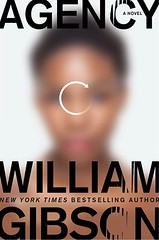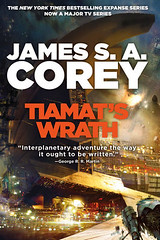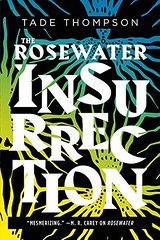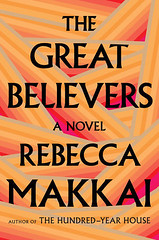“Nothing before the 2020s has ever seemed entirely real, to me. Hard to imagine they weren’t constantly happy, given all they still had. Tigers, for instance.”
—William Gibson, Agency
 Agency
Agency
by William Gibson
![]()
Long wait for this one, reportedly while Gibson altered an already-complete manuscript to account for Trump’s unexpected (to him) election and the disruptions it’s bringing about. IMO he handles it beautifully in “Agency”: in Verity and Eunice’s stub, Hillary Clinton is president, Trump an unpleasant memory (notably, the memory that haunts Gibson’s characters is that of Trump looming threateningly behind Hillary during one of the debates). Trump’s election, in another stub, is almost unfathomable to the inhabitants of “Agency,” both present and future.
Which in itself is a perfect illustration of bifurcating timelines, here called stubs (they were shunts in the first novel of this planned trilogy, “The Peripheral”). I was happy to get back into the universe of “The Peripheral” and its future characters, old friends by now, still meddling in the past and creating new timelines.
Eunice, the autonomous AI, so evoked thoughts of Wintermute in Gibson’s long-ago first novel “Neromancer” I started re-reading an old copy I had laying around to make sure I wasn’t mistaken. I was not.
It is not for me to try to explain the storyline. You get Gibson or you don’t. But I will offer a few comments on parts of “Agency” that stick in my mind:
– For a novel titled “Agency,” the main character Verity and most of the supporting cast exercise very little of it. Everything is scripted by Eunice, and to a lesser degree by a mega-wealthy tech celebrity named Stet. The rest of us are merely along for the ride.
– Eunice and Stet’s ability to orchestrate events, to mobilize dozens of aides and assistants to be in just the right place at just the right time (mostly to hide or rescue Verity from the forces arrayed against her) was the most unbelievable part of this novel. Magical, when you get right down to it. People fuck up; always have. They don’t here.
– The McWolven joins Michael Chabon’s Filipino donut on my list of fictional foods to sample in the afterlife.
In my 2015 review of “The Peripheral” I said the new trilogy might bump Gibson’s Bridge trilogy to second place on my list of Gibson favorites. I am slightly less enthusiastic about “Agency” than I was about “The Peripheral.” For now, the Bridge trilogy stays on top.
I’ll add two general-purpose observations from my earlier reviews of Gibson novels:
Gibson likes complex stories with interrelated events and characters. He’s a student of pop culture, and his novels are right on top of current trends. Even more than complexity and hipness, I think, he likes happy endings. Some say he’s a sentimentalist, but I don’t think hipness has to be dark.
There’s a strong strain of intellectual curiosity behind Gibson’s near-future stories, which always makes for good science fiction, but what I like best about his story-telling is that he leaves it to the reader to figure things out.
 Tiamat’s Wrath (The Expanse #8)
Tiamat’s Wrath (The Expanse #8)
by James S.A. Corey
![]()
(“Tiamat’s Wrath”: 4.5 stars. Overall rating for the 8 novels of “The Expanse” series: 4 stars)
I started watching the Syfy Channel’s “The Expanse” television series a couple of years after reading the first two Expanse novels, “Leviathan’s Wake” and “Caliban’s War.” I recently finished watching the fourth season (now on Amazon), which parallels the action of the 4th novel, “Cibola Burn,” set on Ilus, the first exoplanet to be colonized.
I’ll start my review by repeating what I said after reading the first book, “Leviathan’s Wake”:
I must say, I thoroughly enjoyed this example of good old-fashioned space opera. It’s set in a distant enough future that mankind has spread through the solar system, inhabiting the Moon, several asteroids, Mars and its moons, and some of the moons of the gas giant planets. There are three major political alliances, all at odds with each other: the Earth and Moon, Mars, and the Outer Planet Alliance (the Belt). Although Mars is being terraformed, it is centuries away from being able to sustain human life on its own, and of course inhabitants of the Belt depend on constant resupply to stay alive. The story itself is quite dramatic, involving the discovery of a hostile alien protomolecule capable of wiping out–or drastically changing the very cellular structure of–humanity, and a growing war between the three alliances. One plucky space pirate crew is at the center of the action, and they will remind you of the crew of the Nostromo in Ridley Scott’s seminal movie, Alien. Need I say more? The story will grab you by the nape of the neck and pull you along.
I find it hard to separate the novels from the TV adaptations. Not only are they equally excellent, they are mutually enriching: the TV adaptation enhances the reader’s experience of the novels; the novels add levels and depth to the viewer’s experience of the TV series. I haven’t seen this often. The movie “Master and Commander” managed to add to my love of Patrick O’Brian’s Aubrey/Maturin novels, and HBO’s “His Dark Materials” is off to a great start with its adaptation of “The Golden Compass,” the first novel of Philip Pullman’s trilogy.
I would have loved every novel of “The Expanse” series if the TV adaptation had never existed. But since I also watch and love the TV series, I now see the actors when I follow the characters on the printed page, and with the exception of one or two shortcuts taken by the TV series (example: the actress Cara Gee playing the character Carmina Drummer but also somehow representing another strong character from the novels, Michio Pa), I am totally on board with the TV producers’ choices.
Lovers of science fiction won’t find much to object to in “The Expanse,” the novels or the TV series. I grew up on hard science fiction and it is still my first love. I almost always have wave-the-bullshit-flag moments when reading or watching science fiction; I’ve had only one or two of those in eight novels and four seasons of “The Expanse.”
I can’t say enough good things about the novels (or the TV series). I impatiently wait for the 9th and final (as yet untitled) novel, and I’m delighted that Amazon picked up the torch when Syfy dropped it, and that there will be more seasons to come.
 Open Season (Joe Pickett #1)
Open Season (Joe Pickett #1)
by C.J. Box
![]()
As much as I enjoy reading Lee Childs’ Jack Reacher stories, Jack is a superhero, an infallible figure of fantasy. When Jack Reacher gets even, people die … but not before a righteous ass-kicking. While C.J. Box brings on Reacheresque tension and villainy, when it comes to his human and relatable hero Joe Pickett, it’s more a matter of luck. Joe prevails, a believable form of getting even. But don’t worry. Asses do get kicked, in satisfying ways.
I really like this Pickett guy. He makes mistakes, and plenty of them. He worries about money. He trusts people he shouldn’t. He’s a regular Joe. I really like the depictions of Wyoming, a state I lived in as a teenager and remember fondly. Joe, at least in this first novel, has an almost-too-perfect family, but there are tensions, and I sense troubled teenage years ahead for his daughter Sheridan.
Granted that everything in this novel is fiction, it feels real and true. I think that’s what I liked best about “Open Season,” and have already put a library hold on “Savage Run,” the second novel in the series.
 The Rosewater Insurrection (The Wormwood Trilogy #2)
The Rosewater Insurrection (The Wormwood Trilogy #2)
by Tade Thompson
![]()
I raved over “Rosewater,” the first book of the Wormwood trilogy. Tade Thompson is brilliant as well with “The Rosewater Insurrection,” the second book, but I have to confess I found it tough going during the busy sequence of short chapters describing the climactic battle between the secessionist city-state of Rosewater, the Nigerian government, the alien Wormwood, and the nameless plant-based alien attacking the original alien. There was just too much happening all at once, and … or so it seemed to me … too many characters, each with wildly differing agendas. And, frankly, some of the goings-on during the battle seemed more magic or fantasy than science fiction, although on this point I give Thompson the benefit of the doubt: if humanity ever encounters a truly alien life form (which Wormwood very much is), anything it does may well seem magical to us.
In short, I enjoyed the second book of the trilogy slightly less than I enjoyed the first, mainly from impatience with the drawn-out battle and the mental effort of keeping track of what the different characters were up to.
I must mention, though, that the second book revolves around many of the same characters we met in the first book, and the world Tade Thompson constructed there is the same world here. So much so that I am now tempted to re-read the first book.
Will I read the third? Of course I will. Thompson’s vision is too fascinating to leave in mid-stream.
 The Great Believers
The Great Believers
by Rebecca Makkai
![]()
I can’t say how well this novel captured the impact of AIDS on gay men of the 1980s, but Rebecca Makkai’s story comes across as lived experience, sincere, well-written, and touching, and I particularly liked the novel’s structure, flipping in alternate chapters between mid-1980s Chicago and present-day Paris.
A few sex scenes bothered me, I’m ashamed to admit, and I thought the novel overlong, but the tension in Yale and Charlie’s relationship, the adventure with Nora’s art collection from the Parisian art scene of the 1920s, and Fiona’s search for her lost daughter provided more than enough suspense to keep me turning pages.
This was my book club’s selection for February 2020, and at a meeting in January another member asked a question that basically boiled down to “What’s with this group’s interest in gay literature?” I hadn’t thought about it, but remembered that one of our 2019 selections was Rita Mae Brown’s LGBT young adult novel “Rubyfruit Jungle,” a book I enjoyed but which I found difficult to address in a book review. You can certainly draw equivalences between straight and gay sexuality, and people are people after all, but still there is much that is alien to me in LGBT-themed novels, and they are not ones I would choose to read on my own.
Taking a larger view, though, it is true that straight society would happily write the stories of gay men and women out of our cultural history, and so it seems right to me that a few authors make the effort to write them back in.
 The Night Fire (Harry Bosch #22)
The Night Fire (Harry Bosch #22)
by Michael Connelly
![]()
My reaction to the first of Connelly’s Renée Ballard novel, “The Late Show,” which I rated at four stars (high for me):
I read about a woman LAPD detective in the Los Angeles Times. The article mentioned that Michael Connelly, who writes the Harry Bosch novels, is writing a new series about a detective modeled on that woman. I immediately bought a Kindle copy of Connelly’s first Renée Ballard novel, “The Late Show.” It did not disappoint and I will soon read more. Which makes me wonder why I’ve only read one of the Bosch books when I liked it almost as much as I liked this Ballard book. Good question. Note to self: read more Bosch too.
My reaction to the second, “Dark Sacred Night,” which I rated at 3.5 stars (great but not awesome):
Excellent and engaging police procedural from the author of the Harry Bosch series, featuring his new LAPD character Detective Renée Ballard, this time working with the older, semi-retired Detective Harry Bosch on an unsolved case that figured prominently in Season #3 of “Bosch,” the Amazon Prime TV series.
It strikes me that Michael Connelly must be very involved in the TV series production, given the amount of overlap between the series and the newer Bosch and Ballard novels, and I will not be surprised if Renée Ballard doesn’t show up as a regular in Season #4.
I’m not sure I want my entertainment this thoroughly packaged. My reaction is a desire to read some of Connelly’s earlier Bosch novels, the ones he wrote before Bosch became a TV character, the ones that don’t have actor Titus Welliver on their covers.
I have in fact read the first Bosch novel, “The Black Echo.” It was damn good; so too was Connelly’s first Renée Ballard novel, “The Late Show.” Both are free of TV-series connections, and both stand quite well on their own.
I’ve now finished the third Renée Ballard/Harry Bosch novel, “The Night Fire,” and my reaction is much the same as it was for the second novel. I have not yet seen Renée Ballard make an appearance in the Amazon TV series, but still expect it. I like the way Connelly covers the older Harry Bosch, bad knees and all; I like Renée, her dedication and willingness to play the political game in order to get the job done and nail the bad guys. I like the apparent direction of the Ballard/Bosch series, the solving of cold case crimes.
I didn’t give this one a 4-star rating because Ballard and Bosch get too many breaks in solving their cold cases. Too many gimmies, some of which didn’t seem realistic. But it is a gripping read, and I devoured the novel in two sittings and am now pressing it on my wife because I know she’ll love it.
And as I said in my earlier reviews: I want to read more of the early (pre-TV series) Bosch novels.